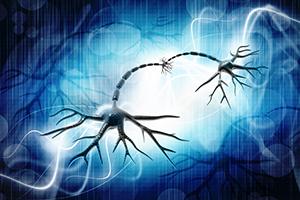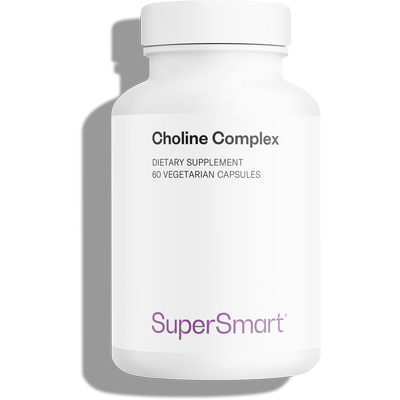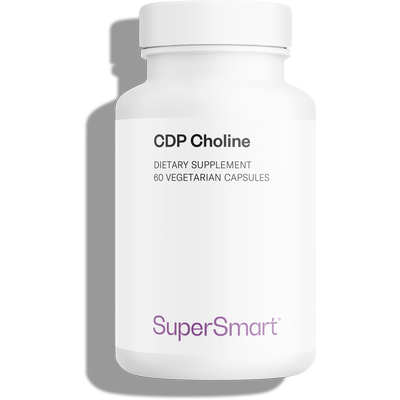28-08-2019
Choline, a little-known but essential nutrient
 Though many people are not aware of choline, it is actually recognised as an essential nutrient by the prestigious US National Academy of Medicine1. This recognition came after investigation of its role, benefits and structure revealed choline’s many functions within the human body, both at a structural and functional level. This research also showed that choline cannot be produced by the body and must therefore be provided by the diet. As a result, a number of studies have been conducted into the potential advantages of supplementing with choline, the findings of which have identified multiple benefits for this essential nutrient!
Though many people are not aware of choline, it is actually recognised as an essential nutrient by the prestigious US National Academy of Medicine1. This recognition came after investigation of its role, benefits and structure revealed choline’s many functions within the human body, both at a structural and functional level. This research also showed that choline cannot be produced by the body and must therefore be provided by the diet. As a result, a number of studies have been conducted into the potential advantages of supplementing with choline, the findings of which have identified multiple benefits for this essential nutrient!
Choline for supporting and improving cognitive function
Precursor of an excitatory neurotransmitter
Choline first attracted scientific interest because of its role in the nervous system. It is in fact the precursor of one of the body’s main neurotransmitters: acetylcholine. Widely-studied, this excitatory neurotransmitter primarily supports the development of cognitive abilities and muscle coordination. Since choline promotes the synthesis of acetylcholine, it offers a number of benefits for healthy neurological, cognitive and muscle function. For example, it may help improve cognitive functions such as memory. It may also be beneficial in the prevention and treatment of certain neurological problems, neurodegenerative diseases like Alzheimer’s, and psychiatric diseases such as schizophrenia.
Improvements in cognitive ability
A Canadian research team investigating the therapeutic potential of choline observed positive effects on cognitive function. Published in the journal Pharmacology Biochemistry and Behavior2, their research tested the efficacy of supplementing with cytidine-diphosphate-choline (CDP-choline), a choline derivative which features in the formulation of dietary supplements. The study involved 24 healthy volunteers who were divided into three groups
- :
- the first, a control group, received a placebo;
- the second was given low dose CDP-choline (500 g) ;
- the third received a moderate dose of CDP-choline (1000 g).
Essential role for choline at a cellular level
Precursor of a membrane phospholipid
In addition to its role in the nervous system, choline is also an essential nutrient for cell function. Alongside its participation in muscle cell activity through the promotion of acetylcholine synthesis, it also plays a role in the structure of cell membranes by enabling the formation of phosphatidylcholine. This is the main membrane phospholipid in the body - a key element of lipid bilayer membranes. As a precursor of phosphatidylcholine, choline thus helps maintain and protect cellular activity in the body.
Protective effect in muscle cells
Scientific understanding of choline’s role in cells was expanded by a study published in the journal Food & Function3 The study’s authors examined the effect of insufficient choline on muscle tissue. They focused particularly on the consequences of choline deficiency both on its transport and on the metabolism of phosphatidylcholine, fatty acids and triacylglycerol. They noted that choline transport in mitochondria, the cells’ powerhouses, was impaired by choline deficiency. They also found a lack of choline reduced phosphatidylcholine synthesis and altered triacylglycerol metabolism. Together, these findings suggest that inadequate choline may negatively affect the structure and activity of muscle cells.
Choline’s importance in the liver
Role in digestion of lipids
As mentioned, choline is the precursor of phosphatidylcholine. As well as being a component of cell membranes, this phospholipid plays an important role in bile. It is involved in the emulsification of fats, a process which facilitates lipid digestion in the intestines. As a result of this mechanism, phosphatidylcholine reduces both the amount of fat stored in the body and the build-up of cholesterol, which primarily helps to prevent certain liver diseases.
Protective effects in the liver
Several studies had already demonstrated a cause and effect link between a lack of choline and accumulation of fat in the liver. A group of researchers wanted to expand on this, by examining the relationship between dietary choline intake and risk of non-alcoholic fatty liver disease (NAFLD), characterised by the accumulation of lipids in the liver. Their study involved 56,000 male and female volunteers, aged 40-75, whose dietary habits and liver condition were assessed in order to determine each participant’s risk of NAFLD. Published in the i>Journal of Nutrition4, the study’s findings suggest that higher dietary choline intake is associated with a lower risk of NAFLD.
Together, these studies confirm the importance of ensuring an adequate intake of choline both for the nervous system, as well as for the liver and for muscle tissues. Choline is found in foods such as eggs, meat, fish and pulses. For an optimal intake, you can also take advantage of nutritional supplements. The new formulation Choline Complex, available from the SuperSmart catalogue, offers three forms of choline: choline bitartrate, alpha-glycerophosphocholine and cytidine-diphosphate-choline (CDP-choline).
> Sources :
1. SH Zeisel et KA da Costa, Choline: An Essential Nutrient for Public Health, Nutr Rev., Novembre 2009;67(11): 615–623.
2. V. Knott et al., Neurocognitive effects of acute choline supplementation in low, medium and high performer healthy volunteers, Pharmacology Biochemistry and Behavior, Avril 2015;131:119-129.
3. V. Michel et al., The impact of choline availability on muscle lipid metabolism, Food Funct. Janvier 2011;2(1):53-62.
4. D. Yu et al., Higher dietary choline intake is associated with lower risk of nonalcoholic fatty liver in normal-weight Chinese women, J Nutr., Décembre 2014;144(12):2034-40.
Order the nutrients mentioned in this article
Further reading
10-10-2016
In India, turmeric is used to treat a wide variety of ailments including gastrointestinal problems, inflammation, headaches, infections and colds. It is turmeric’s curcuminoid content,...
Read more10-04-2019
In a review of published studies on S-adenosyl methionine (SAMe), the American Agency for Healthcare Research and Quality (AHRQ) concluded that SAMe was effective at...
Read more28-06-2017
As the control centre of the central nervous system, the brain has to deal with a constant flow of data, processing millions of bytes of...
Read more© 1997-2026 Fondation pour le Libre Choix
All rights reserved
All rights reserved
Free
Thank you for visiting our site. Before you go
REGISTER WITHClub SuperSmart
And take advantage
of exclusive benefits:
of exclusive benefits:
- Free: our weekly science-based newsletter "Nutranews"
- Special offers for club members only



















